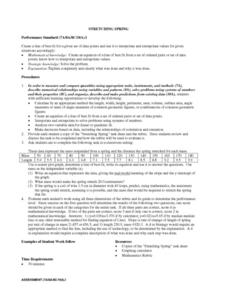Curated OER
Making Cents of Independence
Students explore the causes and major events of the Texan and American revolutions. Comparisons and contrasts are made between the two revolutionary experiences and applied to the symbolism used on the Texas State quarter.
Nemours KidsHealth
Germs: Grades K-2
Students demonstrate knowledge about germs. In this health lesson, students investigate what germs are, how to protect the skin by comparing the skin to apple skins, and the proper hand washing technique for getting rid of germs....
Curated OER
Apples
Students are asked what kinds of vegetables do they like to eat, and what kinds of fruits do they like to eat? They are asked to describe how an apple might taste. Students count the number of green apples, they are told the different...
Curated OER
Human Number Line
Students compare different types of numbers. Each student is given a flashcard containing a decimal, percent, fraction or integer. Teams of students compete, in silence, to determine who can line up in numerical order correctly. They...
Curated OER
Fraction Models
Third graders make models of fractions and mixed numbers. Using fraction strips and drawing pictures, 3rd graders develop conceptual understanding of the equivalent forms. Students use the number line to represent and compare...
Curated OER
Decimals Anyone?
Seventh graders compare and order decimals. Given a set of integers, they compare them using inequalities. In groups, 7th graders participate in hands-on decimal activities. Using string, paper clips and decimal cards, classmates...
Curated OER
Fraction Action
Students create fractions using strips of paper and then compare the fractions.
Curated OER
Place Value
Second graders use physical models to represent and demonstrate place value concepts by using base-ten blocks and hundreds charts. They compare numbers to see which number is smaller or larger and put numbers in order from smallest to...
Curated OER
Elements of Chemistry: The Periodic Table
High schoolers examine the atomic structure of elements. In this chemistry lesson students organize elements of the periodic table according to their atomic mass, and compare their order within the periodic table.
Curated OER
"Julie of the Wolves"
Fifth graders research life in Alaska and compare life there to their lives in this instructional activity. They read "Julie of the Wolves." They research through the novel and other reference books facts about the Alaskan climate and...
Curated OER
Worms And More
Young scholars complete five center activities that in order to determine the attributes of length and area. They study the vocabulary associated with measurement of length and area. They use blocks, play dough, wrapping paper, and...
Curated OER
Approximating Measures
Fourth graders complete a worksheet about approximate measurements. In this lesson on approximation, 4th graders compare the wingspan of a given bird to the wingspan of other birds and classroom objects.
Curated OER
STRETCHING SPRING
Students calculate the length, width, height, perimeter, area, volume, surface area, angle measures or sums of angle measures of common geometric figures. They create an equation of a line of best fit from a set of ordered pairs or...
Curated OER
Seesaws
Learners make direct comparisons between objects using balance and spring scales. They also are encouraged to estimate which object is heavier by holding the objects before using the balance scales. Comparing the masses of objects is the...
Curated OER
Money Circulation: A Story of Trade and Commerce
Young scholars are introduced to the meaning, symbolism, and value of the quarter. They determine the percentage of total monetary value held in quarters and graph the results. Students infer about the U.S. Mint's distrubution of coins....
Curated OER
Indian Ragas
Students explore Indian ragas and learn the differences between an Indian raga and the Western scale. They sing the familiar song "America," first in the Western major scale and then in two Indian ragas (bhairavi and purvi) on a neutral...
Curated OER
Introduction to Decimals
In this math worksheet, students are introduced to decimals by first studying pattern blocks showing a number with tens, ones and tenths. Students locate decimals on number lines and rulers and shade decimal pictures. Students compare...
Curated OER
Where In the World Are We?
Fifth graders read postcards and find their locations on maps. They use the pictures and text on the postcards to write about imaginary vacations. They compute the mileage and compare it to TripMaker data.
Curated OER
Moral and Ethical Beliefs: Proverbs
Young scholars compare and contrast the cultures of Japan and the United States. In groups, they are given a proverb from each country and note the similiarties in their teachings. They complete a worksheet and share their findings...
Curated OER
Counting on Counting
Students recognize that counting tells how many objects are in the set irrespective of how they are arranged or the order in which they are counted. They solve problems involving one more or less to a given set using their knowledge of...
Curated OER
Writing Similes
Fifth graders identify and write similes. They define simile and discuss different examples, and with the help of a thesaurus, write original similes that compare the colors of crayons to objects or feelings. Students copy their rough...
Curated OER
Marvelous Mathematics
Students make a table on the computer, but create fractions and equivalent fractions through the use of color. They are able to manipulate fractions in order to gain a greater understanding of the meaning of whole number that is broken...
Curated OER
What is a Box and Whisker Plot?
Eighth graders explore the correct use of box and whisker plors. The times when they are appropriate to use to compare data is covered. They plot data according to statistical analysis including mean, median, and mode.

























